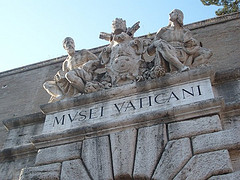The Financial Powers That Be Shut Down Credit Card Use At Vatican City Sites
Vatican City had a bit of an embarrassing situation on its hands come New Year’s Day, when tourists and pilgrims waited in long lines to see holy sites only to find out all electronic purchases had been suspended. That means no credit cards anywhere in the city state.
See, the bank that handles card payments for the Vatican was refused authorization by the Bank of Italy over concerns about the city state’s compliance with international banking regulations.
The Guardian says the Holy See was embarrassed by the snafu, which halted credit card payments at the Sistine Chapel, shops, museums and the post office, and issued a notice on its museums’ websites to apologize for any inconvenience to visitors. It also blamed “reasons beyond [its] control.”
So what exactly are those reasons? It seems that Deutsche Bank Italia (DBI) used to handle card payments for Vatican City, but the Bank of Italy (BoI) denied it the ability to keep doing so, because DBI and other Italian-registered banks aren’t meeting preconditions for certain activities. One of those failures involves DBI’s failure to really go after money laundering.
Until DBI is replaced, electronic payments will be on hold. A Vatican spokesman says the hunt is on to find a suitable bank, and that the suspension will be “brief.”
The Vatican has been trying to get on everyone’s good side, financially, but that’s not exactly going so well: In March the U.S. State Department said it was “vulnerable” and “of concern.”
One word of advice to travelers — if you go to an ATM to get enough euros for your visit to the Vatican, make sure not to let anyone follow you from there to the metro and cut the side of your bag open and take your wallet while you’re distracted by the Europeanness of it all. It is not a fun experience.
Vatican City tourists’ card payments stopped by higher power [The Guardian]
Want more consumer news? Visit our parent organization, Consumer Reports, for the latest on scams, recalls, and other consumer issues.


